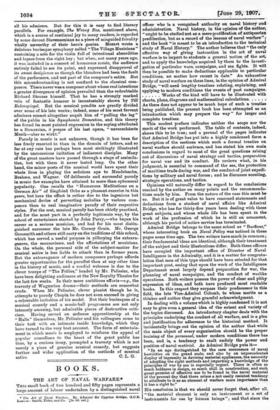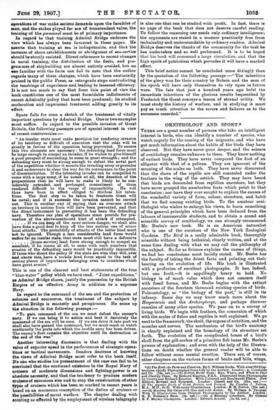BOOKS.
THE ART OF NAVAL WARFARE.*
THIS small book of two hundred and fifty pages represents a large amount of labour undertaken by a distinguished naval
• Th. Art of Nara/ Warfare. By Admiral Sir Cypricm Bridge, U.C.B. Lon,lou Smith, Elder, sad Co. Ps. 01. set.]
officer who is a reeognieed atithority on naval history and administration. Naval history, in the opinion of the author; "ought to be steadied not as a mere gratification of antiquarian predilection, but as a record of the lessons of naval warfare"; and the book "is meant to be an introduction to the technical study of Naval History." The author believes that "the only effective way of giving instruction in the art of naval warfare is to impatt to students a general notion of the art, and to apply the knowledge acquired by them to the investi- gation of particular wars, campaigns, and sea fights. It will then be possible to make deductions applicable to particular conditions, no matter how recent in date." An exhaustive study of naval warfare on these lines, in the opinion of Admiral Bridge, "will need lengthy treatises relating, explaining, and applying to modern conditions the events of past campaigns.
Works of the kind will have to be illustrated with charts, plans, diagrams and mathematical calculations As there does not appear to be much hope of such a treatise being published, the present book has been attempted as an introduction which may prepare the way" for larger and complete treatises.
This modest preface indicates neither the 'mope nor the merit of the work performed. The table of contents, indeed, shows this to be true; and a perusal of the pages indicates that Admiral Bridge has put into a highly condensed form a description of the sections which such a formal treatise on naval warfare should embrace, and has stated his own main conclusions in regard to most of the great questions arising out of discussions of naval strategy and tactics, preparation for naval war and its conduct. He reviews what, in his judgment, is essential to command of the sea, the protection of maritime trade during war, and the conduct of joint expedi- tions by military and naval forces ; and he discusses scouting, strategic operations, and tactics.
Opinions will naturally differ in regard to the conclusions reached by the author on many points and the recommends,- tions made by him. From the nature of the case this must be so. But it is of great value to have reasoned statements and deductions from a student of naval affairs like Admiral Bridge, who has for thirty-five years been dealing with these great subjects, and whose whole life has been spent in the work of the profession of which he is still an ornament, although his period of active service has terminated.
Admiral Bridge belongs to the same school as " Bartleur," whose interesting book on Nava/ Policy was noticed in these pages some time ago. The two writers have much in common; their fundamental ideas are identical, although their treatment of the subject and their illustrations differ. Both these officers have occupied the important office of Director of Naval Intelligence in the Admiralty, and it is a matter for congratu- lation that men of this type should have been selected for that important post, seeing that upon the work of the Intelligence Department must largely depend preparation for war, the planning of naval campaigns, and the conduct of warlike operations. Both writers possess the power of clear and pithy expression of ideas, and both have produced most readable books. In this respect they surpass their predecessor in this field, the late Vice-Admiral Colomb, to whose merits as a thinker and author they give graceful acknowledgment.
In dealing with a volume which is highly condensed it is not easy to give even a general idea of the extent and variety of the topics discussed. An introductory chapter deals with the principles underlying the conduct of all warfare, and is a plea and justification for adherence to the historical method. It
incidentally brings out the opinion of the author that while the main object of every organisation should be the proper training of the pereonnel, under modern conditions there has been, and is, a tendency to exalt unduly the power and position of naval materiel. As Admiral Bridge puts it—
"In an age distinguished by the rare occurrence of naval hostilities on the grand scale, and also by an unprecedented display of ingenuity in devising material appliances, the necessity of adopting the right methods and imparting a knowledge of the principles of war by sea is especially urgent. There is often so much boldness in design, so much skill in construction, and such great promise of effective use to be found in the naval material of the present day that there arises a not easily resisted tendency to attribute to it as an element of warfare more importance than it has a right to."
His conclusion is that we should never forget that, after all, "the material element is only an instrument or a set of instruments for use by human beings "; and that since the operations of war make serious dettninds upon the faculties of wen, and the stakes played for are of transcendent value, the training of the personnel must be of primary importance.
In regard to that training Admiral Bridge endorses the view which has always been favoured in these pages. He asserts that training at sea is indispensable, and that the increase of shore establishments or abridgment of eea-sertiee should be Stoutly resisted. Direst references to recent changes in naval training, the distribution of the fleets, and pro- grammes of shipbuilding are almost entirely avoided, but no one familiar with the facts can fail to note that the author regards Many of these changes, which have been unstintedly praised in the public Press, as retrograde steps contradicting the teachings of experience and leading to lessened efficiency. It is not too much to say that from this point of view the book constitutes one of the most formidable indictments of recent Admiralty policy that have been produced; its studied moderation and impersonal treatment adding greatly to itS effect.
Space fails for even a sketch of the treatment of vitally important qnestions by Admiral Bridge. One or two examples must suffice. In regard to the possible invAS1011 of Great Britain, the following passages are of special interest in vie* of recent controversies .— " An insular gate must make provision for rendering invation of its territory so difficult of execution that the odds will be greatly in favour of the operation being prevented. To ensure this two elements are necessary : the defending land force must be large enough to compel an invader, if he wishes to give himself good prospect of eucceeding, to come in great strength ; and the defending navy mutt be Strong enough to defeat the natal part 9f the expedition whether it escorts the invading army or precedes it and endeavours to clear the way for its conveyance to the point of disembarkation. If the intending invader can be compelled to come with a large army, if he comes at all, the duration of the preparations that he will have to make is likely to be con. siderably extended, and prolonged concealment of them rendered difficult to the verge of impossibility. lie will thus have been in effect obliged to disclose his inten- tions. The first step to be taken to frustrate these will be naval; and if it rawdeeds the invasiort cannot be carried out. This is another way of saying that An over-sea attack on territory in serious form will have been prevented, and that the direct instrument In preventing it has been the defending navy. Therefore our plan of operations must provide for pre- vention of the above-mentioned kind of attack if attempted.
If we can keep off the more serious danger, we shall also have done a good deal to keep off the less serious one of minor local attacks. The probability of attacks of the latter kind must not be ignored. Though a less considerable land force would. suffice for an insular state, that state mast still have a defensive [home service) land force strong enough to compel an assailant, if he comes at all, to come with such numbers that evasion of the defending navy would be practically impossible. it thbae who direct the policy of the state are wise they will, over and above this, have a mobilo land force equal to the task of seizing places of importance belmiging even to countries which have great armies."
This is one of the clearest and best statements of the true "blue-water" poliey which we have read. "Joint expeditions," Se Admiral Bridge shows, justify the possession by the British tmpire of an effective Army in addition to a supreme
Navy.
In regard to the command of the sea and the protection of colonies and commerce, the treatment of the subject by Adtniral Bridge is masterly and perspicuous. He sums up the oltaation in the following passage :—
"To gain cominatid of the sea we must defeat the enemy's nary. If we can bring it to action and beat it decisively the oceninand of the sea will be ours. If we Can drive it into port we shall also leave gained the command, but we must mask or watch continually the ports into which the hostile navy has been driven. The enemy's fleet reaming the objective until its destruction or the end of the war."
Another interesting disonssion is that dealing with the value Of superior speed in the performance of strategic opera- tions or tactical movements. Readers desirous of knowing the views of Admiral Bridge must refer to the book itself. NO one who studies his presentment of the case can fail to be :evinced that the continued existence in the Royal Nary of cruisers of moderate dimensions and fighting-power is an abaolute necessity, and that the tendency to produce modern cruisers of enormous site and to stop the construction of other types of cruisers which has been so marked in recent years is based on an erroneous conception of the duties of cruisers or the possibilities of naval warfare. The chapter dealing with scooting as affected by the employment of wireless telegraphy is also one that can be studied with profit. In fact, there is 120 page of the book that does not deserve careful reading. To follow the reasoning one needs only ordinary intelligence; the arguments are stated in a manner practically free from technicality and understandable by ordinary readers. Admiral Bridge deaerves the thanks of the community for the task he has undertaken and so well performed. It is to be hoped that his book will command a large circulation, and that the high spirit of patriotism which pervades it will have a marked effect.
This brief notice cannot be concluded more fittingly than by the quotation of the following passage The inheritors of the glory won for their country by Nelson and the men of his epoch will have only themselves to rely upon in future wars. The fate that just a hundred years ago betel the immediate inheritors of the glorious results bequeathed by Frederick the Great conveys a lesson of eternal utility. We must study the history of warfare, and in studying it must pay as much attention to the errors and failures as to the successes recorded."

















































 Previous page
Previous page